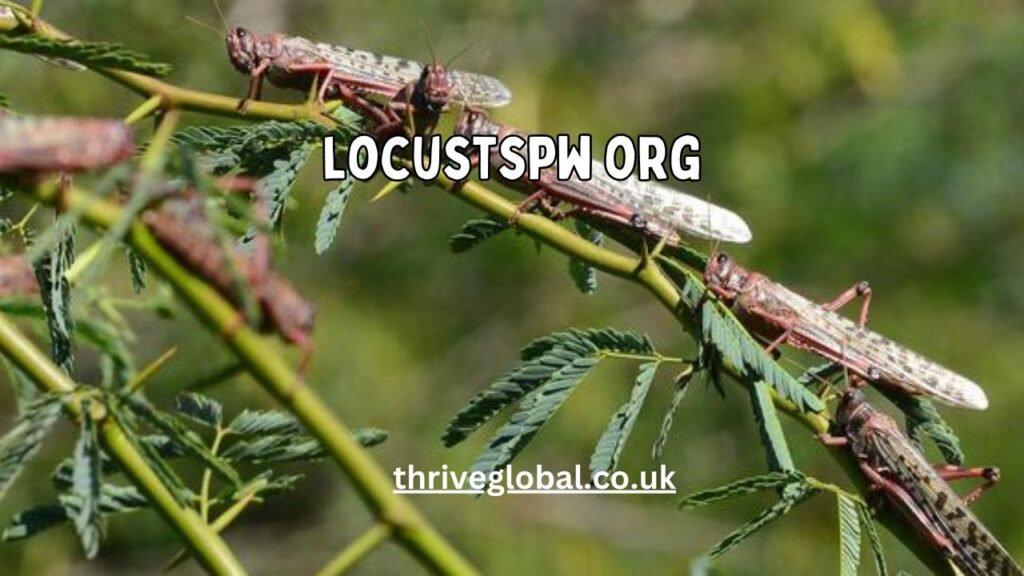In the agricultural sector, one of the most feared threats is locust infestations. These pests can devastate crops, leading to massive economic losses and food insecurity. Fortunately, organizations like locustspw org are dedicated to combating this threat through innovative and effective strategies. This article will explore the role of locustspw org, its approach to locust management, and the impact it has on safeguarding agriculture.
Introduction to locustspw org
locustspw org is an organization committed to controlling and preventing locust infestations worldwide. The organization’s mission is to provide support and solutions to communities and farmers facing the threat of locust swarms. Through a combination of research, technology, and community engagement, locustspw org has become a key player in the against locusts.
The Importance of locustspw org in Agriculture
Agriculture is the backbone of many economies, especially in regions where subsistence farming is prevalent. Locust swarms pose a significant risk to food production, and without proper management, they can lead to famine and economic collapse. locustspw org plays a crucial role in mitigating these risks by offering tools, resources, and expertise to farmers and governments.
How Locust Swarms Affect Agriculture
Locust swarms are capable of traveling vast distances and consuming large quantities of crops in a short period. A single swarm can cover several hundred square kilometers and consume the same amount of food in one day as the population of a large city. This makes them one of the most destructive pests in the world.
Economic Impact of Locust Infestations
The economic impact of locust infestations can be devastating. Farmers lose their crops, which leads to reduced income, food shortages, and increased poverty. In some cases, entire communities are left without food or the means to earn a living. The ripple effects can be felt across the entire economy, as agricultural products are often a significant part of a country’s exports.
The Strategies of locustspw org
locustspw org employs a variety of strategies to combat locust infestations. These strategies are based on scientific research and are designed to be effective in different environments and situations. The organization’s approach is comprehensive, addressing both the prevention of locust outbreaks and the management of existing swarms.
Early Warning Systems
One of the key strategies employed by locustspw org is the use of early warning systems. These systems are designed to detect locust activity before it becomes a full-blown infestation. By monitoring weather patterns, vegetation, and locust behavior, locustspw org can predict when and where swarms are likely to occur.
Technology in Early Warning Systems
The organization uses a combination of satellite imagery, drones, and ground-based sensors to collect data on locust populations. This data is then analyzed to predict the movement and development of swarms. The use of technology allows for more accurate and timely responses to potential infestations.
Community Engagement and Education
locustspw org recognizes that local communities play a crucial role in preventing and managing locust infestations. The organization works closely with farmers and community leaders to educate them on how to identify and report locust activity. This grassroots approach ensures that potential infestations are detected early and that communities are equipped to take action.
Training Programs for Farmers
The organization offers training programs that teach farmers how to monitor their fields for signs of locusts. These programs also cover methods for controlling locust populations, such as the use of pesticides and other control measures. By empowering farmers with knowledge and tools, locustspw org helps to reduce the impact of locusts on agriculture.
Innovative Approaches to Locust Control
In addition to traditional methods of locust control, locustspw org is at the forefront of developing new, innovative approaches. These approaches are designed to be more sustainable and environmentally friendly, reducing the need for harmful pesticides.
Biological Control Methods
One of the most promising areas of research is the use of biological control methods. This involves the use of natural predators or pathogens to control locust populations. locustspw org is working on developing and implementing these methods in the field, with the goal of reducing the reliance on chemical pesticides.
The Role of Fungi in Locust Control
Research conducted by locustspw org has shown that certain types of fungi can be effective in controlling locust populations. These fungi infect and kill locusts, reducing their numbers and preventing swarms from forming. This method is environmentally friendly and does not harm other wildlife or the ecosystem.
Genetic Research and Locust Management
Another area of innovation is genetic research. locustspw org is exploring the potential of using genetic modification to create locusts that are less likely to swarm. By altering certain genes, it may be possible to reduce the likelihood of locusts forming large, destructive swarms.
Challenges and Ethical Considerations
While genetic modification offers exciting possibilities, it also raises ethical and environmental concerns. locustspw org is committed to conducting this research responsibly, with careful consideration of the potential risks and benefits.
Global Collaboration and Partnerships
locustspw org understands that locust control is a global issue that requires collaboration across borders. The organization works with governments, international agencies, and other non-profits to coordinate efforts and share resources.
Working with Governments
Governments play a critical role in locust control, as they are often responsible for implementing large-scale control measures. locustspw org works closely with governments to provide technical assistance, training, and resources. This collaboration ensures that locust control efforts are coordinated and effective.
International Agencies and locustspw org
locustspw org collaborates with international agencies such as the Food and Agriculture Organization (FAO) of the United Nations. These partnerships allow for the sharing of data, research, and best practices, which enhances the global response to locust infestations.
Non-Profit Partnerships
In addition to working with governments and international agencies, locustspw org partners with other non-profit organizations. These partnerships allow for a more comprehensive approach to locust control, as different organizations bring their expertise and resources to the table.
Community-Based Organizations
One of the key partnerships for locustspw org is with community-based organizations. These organizations have a deep understanding of the local context and are often best placed to implement locust control measures on the ground. By working together, locustspw org and these organizations can more effectively address the threat of locusts.
The Impact of locustspw org’s Work
The work of locustspw org has had a significant impact on reducing the threat of locusts to agriculture. Through its comprehensive approach, the organization has helped to prevent and control infestations in some of the world’s most vulnerable regions.
Case Studies: Success Stories from the Field
Several case studies highlight the effectiveness of locustspw org’s strategies. These success stories demonstrate how the organization’s work has protected crops, saved livelihoods, and prevented food shortages.
Locust Control in East Africa
One of the most notable successes of locustspw org is its work in East Africa. In recent years, the region has been hit by some of the worst locust infestations in decades. Thanks to the efforts of locustspw org, many communities were able to protect their crops and avoid the devastating impacts of these swarms.
Future Prospects: Scaling Up Locust Control Efforts
While locustspw org has made significant progress, the threat of locusts remains. The organization is focused on scaling up its efforts, expanding its reach to more regions, and continuing to develop innovative solutions.
Expanding Early Warning Systems
One of the key areas for expansion is the early warning systems. locustspw org aims to increase the coverage of these systems, ensuring that more regions are monitored and protected. This will require investment in technology and training for local communities.
Research and Development
locustspw org is committed to ongoing research and development to improve locust control methods. This includes further exploration of biological control methods, genetic research, and the development of new technologies. By staying at the forefront of research, the organization can continue to offer effective solutions to the threat of locusts.
The Role of Donors and Supporters
The work of locustspw org is made possible by the support of donors and supporters. Continued investment in the organization’s work is essential to ensure that it can continue to protect agriculture and prevent food insecurity.
Conclusion
locustspw org plays a vital role in the global fight against locust infestations. Through its innovative strategies, commitment to research, and collaboration with partners, the organization has made significant progress in reducing the threat of locusts to agriculture. However, the work is far from over. Continued support and investment are needed to ensure that locustspw org can continue its mission and protect the world’s food supply from this devastating pest.
FAQs
What is Locustspw.org?
It is a platform dedicated to providing information, resources, and support for the study and management of locust populations. We aim to raise awareness about locusts and their impact on agriculture and the environment.
Why are locusts a concern?
Locusts are known for their swarming behavior, which can lead to devastating effects on crops and livelihoods. They can consume vast amounts of vegetation, resulting in food shortages and economic challenges in affected regions.
How can I report a locust outbreak?
If you observe a locust outbreak in your area, please contact your local agricultural department or extension service. You can also reach out to us through our contact form for guidance on reporting and managing the situation.
What resources does Locustspw.org offer?
We provide a variety of resources, including research articles, management strategies, educational materials, and updates on locust behavior and migration patterns. Our goal is to equip individuals and communities with the knowledge needed to address locust-related challenges.
How can I get involved with Locustspw.org?
You can get involved by volunteering, sharing our resources with your community, or donating to support our research and outreach efforts.
Are there any upcoming events or workshops?
Yes! We regularly host events and workshops focused on locust management and research. Check our Events page for the latest updates on upcoming activities and how to register.
How can I stay updated on locust-related news?
To stay informed, subscribe to our newsletter and follow us on our social media platforms. We regularly share updates, articles, and important information related to locusts and their management.
Who can I contact for more information?
For further inquiries, please reach out to us through our contact page. We’re happy to assist with any questions or concerns you may have regarding locusts and our initiatives.



